What are typical vegan prejudices and misconceptions about a plant-based diet? In fact, there are countless persistent clichés that prevent many people from taking a more serious look at the Reasons for veganism to deal with.
It is often enough to say the word "vegan" to create a strong reaction at the counterpart or even a emotional conflict trigger. This is only logical - after all, most people are particularly concerned about their own eating habits and animal welfare. But there are ways and means of making the general discourse more objective in future.
In this article, you will learn about some of the most typical prejudices about veganism and plant-based nutrition. I'll present them to you one by one, debunking and refuting them. Use this knowledge, for example, to form a more informed opinion about the diet or simply to better understand the vegans around you. Let's go!
The most common prejudices against vegans and a plant-based diet
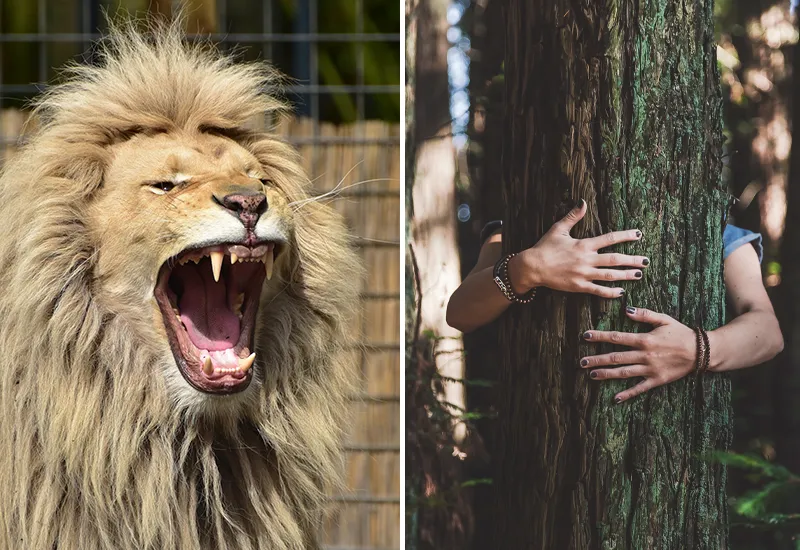
Let's not waste any time. Whether dangerous half-knowledge, myth or cliché - these are the most common and sometimes even most annoying sayings that I often hear as a vegan in everyday life may. 😉
Book Tip: You can also find some of the prejudices in the following book "Vegan is nonsense!" (is available here*) by Niko Rittenau, Ed Winters and Patrick Schönfeld. The authors are experienced debaters and refute all prejudices against vegans in a logical and plausible way.
Vegan Prejudice #1 - "Eating animals is my personal choice."
Similar prejudice: what you eat is your own business - live and let live.
A personal decision is a decision that only affects you. For example, if you decide tomorrow whether to wear the red or the blue sweater. But when we decide to eat animal body parts, it is definitely a personal decision. always involves a victim.
So eating meat is no longer a decision that affects only yourself. And that is why it is also Not a personal decision. Especially in light of the fact that we no longer need to eat animals in order to survive - and that the consumption of animal products exacerbates other problems (e.g. the Rainforest deforestation and Climate Change), which have consequences for all living beings on earth.
Tip: Everyday discussions often end with the fact that meat, cheese and other animal foods simply taste too good to stop eating them. After all, taste is one of the Most honest arguments for not being vegan. In the linked article you will get to know more of them.
Vegan Prejudice #2 - "Without animal products, you lack protein."
Similar prejudice: Vegan diet is unhealthy.
In fact, in many plant foods even more proteins than in animal meat. Particularly rich in protein are for example Legumes, in particular Soybeans, moreover Seitan (is available here*), Nuts, seeds and Whole grain products.
But also Broccoli or Mushrooms have - in terms of calories - a high protein content. Pumpkin seeds, peanuts and Oats are also good, alternative sources of protein. So no one needs to fear a protein deficiency due to a meat-free diet. How you can increase your Cover your protein needs with plant-based foodsyou can also find out more in the linked article.
A balanced one, vegan diet is not unhealthy. Definitely unhealthy, on the other hand, are residues of Antibiotics, pus or feces in animal foods. Animal products are even responsible for many of the nutrition-related widespread diseases (e.g. type 2 diabetes or high blood pressure).
There are generally not an essential nutrient that you can only find in animal products. As with any other form of nutrition, a plant-based diet is all about providing your body with the nutrients it needs for long-term health.
Therefore, to be on the safe side, when you make the switch to a plant-based diet, you should Regular blood tests (Click here for the Vegan Nutrient Check*) in order to ensure the supply of the so-called "potentially critical nutrients".
Tip: Just as often it is said that with vegan diet does not build muscle can. In the linked article, you can find out why you can become or stay fit and fit with a purely plant-based diet. And you will learn vegan competitive athletes:inside that prove this.
Vegan Prejudice #3 - "Vegan is way too expensive."
Similar prejudice: I can't afford vegan food.
In fact, I hear this Prejudice especially towards vegan substitute products especially often. But let's get straight to the point: vegan food doesn't have to be expensive! Pasta, rice, potatoes, pulses or regional Vegetables are even the cheapest food in the supermarket.
However, vegan substitute products are sometimes comparatively expensive for example, meat and cheese. The Price differences However, this is mainly due to (still) lower production volumes and few competitive offers, the state subsidization of the Factory Farming and the moderate tax rate for cow's milk, meat and other animal products.
Ready-made products with meat are also often expensive. But if you only resort to vegan meat substitutes now and then and otherwise cook mainly fresh with pulses, pasta, rice or vegetables, your plant-based diet can ultimately be even cheaper than a mixed diet.
Vegan Prejudice #4 - "Plants have feelings too."
Similar prejudice: when harvesting plants, animals also die.
There are no scientists:inside who could prove that plants are a central nervous system that could indicate a possible sensation of pain. With Animals have been proven to have feelings. Dogs, for example, wag their tails or throw themselves on their backs when they feel joy and chickens start pecking each other when they get stressed in the dark, cramped conditions of factory farming.
So animals clearly have feelings - Plants not according to current knowledge.
But even if plants had feelings, you should live vegan a fortiori. Because to produce one kilogram of beef, for example, about 25 kilograms of grain are needed1This means that significantly more animals are at risk when the animal feed is harvested.
Vegan Prejudice #5 - "No animals die for eggs and milk."
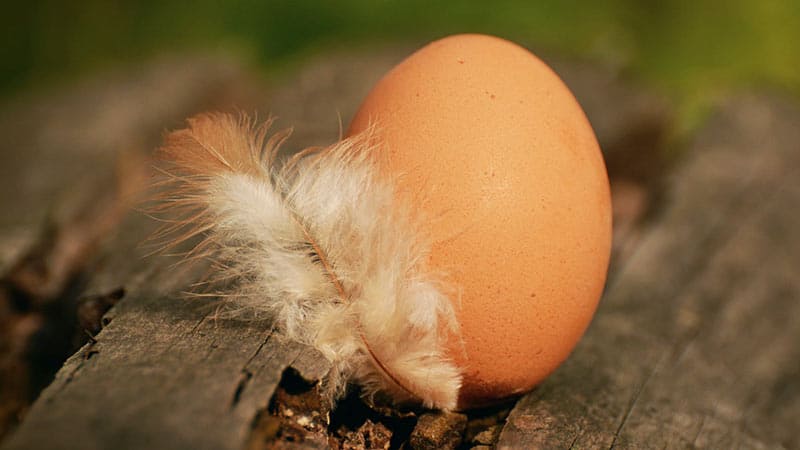
Similar prejudice: I do not eat their body parts.
Unfortunately, this is another common misconception that has also accompanied me for a long time. Through one or the other vegan documentation but then I learned that laying hens have a natural life expectancy of up to eight years. And since their Laying performance decreases rapidly, the hens are slaughtered after only 1.5 years for economic reasons.
Male chicks are a by-product of the egg industry. And as they are useless to the industry, they are treated as such: Shortly after hatching, on the very first day of their lives, the male chicks are Thrown into industrial meat grinders and shredded or gassed alive. This Chick Shredding is a common practice for caged, free-range and organic eggs.
Male calf The situation is similar. Since they do not give milk and are too lean to be fattened, they too are largely worthless to the industry. For this reason, they are also treated as unwanted waste viewed and killed.
Their mothers are also real high-performance machines - and the female calves soon will be. The required "milk output", however, they can provide for a maximum of 6 years2before they lose their value to the industry and are killed. This often happens much earlier because they collapse from exhaustion. Their average life expectancy is around 20 years.
Tip: Why the vegetarian diet is not enoughif you do not have cruelty to animals more, I'll explain in another blog post.
Vegan Prejudice #6 - "Vegan:in's soy consumption is destroying the rainforest."
Similar prejudice: Soy and other imported products eat anyway only the Veganer:innen.
Of the harvest of the world's soybean crops, in reality about 80 percent as ground animal feed in industrial animal feed production. Cows, pigs and chickens grow particularly quickly as a result. Around 18 percent of the harvest is also processed so that the product can be used as biodiesel or frying oil, for example.
Only about 2 percent are actually made into soy patties, schnitzels, plant-based milk or other delicacies of the meat-free diet.3 As a rule, these are then European organic soy from GMO-free agriculture. Genetically modified soy is not even permitted as food for end consumers in Germany - but it is permitted as animal feed. Soy cultivation for animal products thus destroys the rainforest.
A similar prejudice is that vegan:in consume so many imported products - for example. Gooji berries and avocados. Whether vegans or meat eaters consume more imported products cannot currently be proven. From my own experience, however, I know that someone who is vegan at heart is very consciously concerned with the ethical, social and ecological consequences of their own actions and strives to be more environmentally friendly. live as sustainably as possible.
Tip: About the special Prejudices against soy I have also created a separate article for you.
Vegan prejudice #7 - "That's just the way the food chain is - and we're at the top."
Similar prejudice: we are intelligent omnivores who have always eaten meat. Moreover, other animals also eat animals.
For one thing, we are not at the top of a natural food chain. Otherwise you would not be afraid to meet a lion unarmed or swimming in a pool with crocodiles or sharks.
And secondly, a food chain is a group of organisms that are dependent on each other in a certain order as food. However, we are not dependent on eating animal body parts. We can eat a purely plant-based diet and not have to fear any negative, health consequences.
Even if we were at the top of the food chain: How could we justify killing around 74 billion farmed animals every year just to feed them? Eating body parts even though we don't have to?4 And why do we humans feel so uncomfortable when we see pictures of how animals are treated for our food? Malaise is not exactly the behavior you would expect from apex predators.
And what about the argument of intelligence? Every human and non-human animal is more intelligent in some discipline than the other. But even if we were more intelligent in every discipline: Intelligence cannot be used to justify deliberately caused sufferingthat is done to other living beings for a steak or a bologna sandwich.
As you can see, there are other clichés and misconceptions in this prejudice. So that this paragraph does not become too long, I explain and invalidate them in these, further articles:
- Are we humans carnivores, omnivores, or herbivores?
- Animals also eat other animals - so I can do that too.
- We have always eaten meat.
Vegan Prejudice #8 - "I only eat meat from animals that have been humanely slaughtered."
Similar prejudice: I eat very little meat - and when I do, it's from happy animals that have had a good life.
Humane slaughter is a so-called Oxymoron - two terms that contradict each other. Humane means merciful, humane, lenient and without harshness. You cannot kill a living being in a merciful, humane way that does not want to die.
Or how would you slaughter or kill someone humanely? Certainly not with a captive bolt gun, upside down in an electric bath and certainly not in a gas chamber. But these are precisely the most "humane" methods of killing in factory farming, from which around 96 percent of meat in Germany originates.5
Try to put yourself in the cow's or pig's shoes and then decide which of these methods of death you would prefer. Whether organic or conventional farming - in the end you end up in the same slaughterhouse.
Assuming that an animal could actually be killed humanely, how would you ensure that the animal was killed humanely for you when you buy your meat? You can not guarantee if the animals were happy and had a good life. And even if they did: Wouldn't you rather redeem the animals that have a bad life so that the happy animals can continue to live out their joy of life?
Vegan Prejudice #9 - "If you were stranded on a desert island, you would eat meat."
Similar prejudice: When it comes to survival, you'd kill an animal too - plus you have leather shoes and a smartphone and you're not perfect.
The Veganism is not about making everything perfect. Rather, it is about one's own daily actions do not require sacrifices.
But suppose I really were standing on a desert island: If there were animals on this hypothetical island, then there would also be vegetation - in other words, plants that you could eat. In reality we are lucky enough, to live where we can get all the food we need to live at any time. We do not fight for our survival, but have the free choice whether we eat body parts of animals or eat a plant-based diet.
On the Lack of perfection is often alluded to with the smartphone or the leather shoe argument - because child labor may have been used or because one can simply not 100 percent vegan is. But apart from the fact that no one is perfect, a smartphone at least helps to participate in daily social life - and the leather shoes are usually old stock or even made of vegan leather for Veganer:innen.
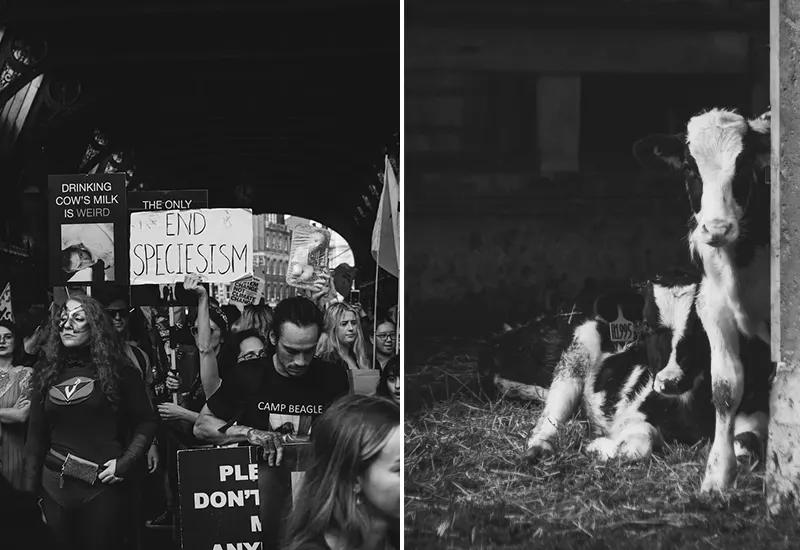
Vegan Prejudice #10 - "The whole world will never go vegan."
Similar prejudice: You alone can't change anything anyway.
Veganism is more than a passing trend. It describes a heartfelt commitment to animal welfare that you don't suddenly stop. Veganism is a global movement and animal-friendly way of life, which is so many injustices in the world eliminated at the same time - but it also takes time.
It also took 400 years, for example, to convince white Americans to stop keeping slaves. Injustices, however, do not exist forever. You don't become a vegan because meat tastes so bad, but because your heart tells you that it is wrong to exploit, torture and kill animals for your own pleasure - and to let 733 million people go hungry6while at the same time we feed 56 billion farm animals.7
So veganism actually counteracts several injustices at once - that's the reason that at some point in the future, basically. feed all people vegan be Eating animals will then be socially frowned upon.
In any case, you are not alone on the way there. The movement is growing rapidly. The only question is: Which side of history do you want to be on? On the side of the people who have spent their lives paying for animal suffering or on the side of the people who have worked for the welfare and rights of animals?
Debunking prejudices against veganism in everyday life
I hope that I can clear up a bit more of the usual slogans that vegans are currently still exposed to and Reduce possible prejudices could. There are so many more misconceptions and clichés, but to name them all would have gone beyond the scope of this article.
Just listen to your heart, break away from old habits and let new routines emerge. Personally, after the Dominion film and some Street interviews of animal rights activists my prejudices, because since then I have been making my nutritional decisions Viewed from the perspective of animals have.
Finally, I would like to show you once again the Book "Vegan ist Unsinn!" to the heart. Because it really does logically refute all prejudices against vegans. If you like, get it here*.
"The greatness of a nation and its moral progress can be judged by the way its animals are treated."
Mahatma Gandhi (more at Animal Welfare Quotes)
Do you have questions or do you know more vegan prejudices and quick-witted answers to them? Then feel free to leave a comment!
Stay kind to all creatures,

PS: For more information and a good start to vegan everyday life, I recommend the detailed article on the vegan lifestyle.
References:
- Dinge erklärt - Kurzgesagt: Fleisch - Das leckerste Übel der Welt, YouTube, 24.01.2019, Web, 10.03.2025 at 10:54, in: https://www.youtube.com/watch?v=y6f3dwxexZM. ↩︎
- F. Enzenhofer: Let the chickens have their eggs!, available at https://www.veganblatt.com/huehner-eier. [10.03.2025]. ↩︎
- Dinge erklärt - Kurzgesagt: Fleisch - Das leckerste Übel der Welt, YouTube, 24.01.2019, Web, 10.03.2025 at 08:53, in: https://www.youtube.com/watch?v=y6f3dwxexZM. ↩︎
- Bayerischer Rundfunk: Animal welfare label - a way out of factory farming? (05.10.2022), available at https://www.daserste.de/information/wissen-kultur/w-wie-wissen/tierwohllabel-100.html. [18.01.2023]. ↩︎
- ANINOVA e. V.: Discounter to butcher meat - 96 percent from factory farming, available at https://aninova.org/news/anteil-massentierhaltung. [10.03.2025]. ↩︎
- Deutsche Welthungerhilfe e.V.: Hunger: Spread, Causes & Consequences, available at https://www.welthungerhilfe.de/hunger. [10.03.2025]. ↩︎
- M. P. Rowland: 11 Facts About Your Food That Will Shock You (as of 03.01.2017), available at https://www.forbes.com/sites/michaelpellmanrowland/2017/01/03/shocking-food-facts. [10.03.2025]. ↩︎

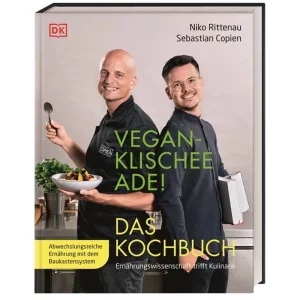

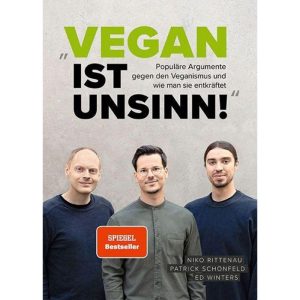

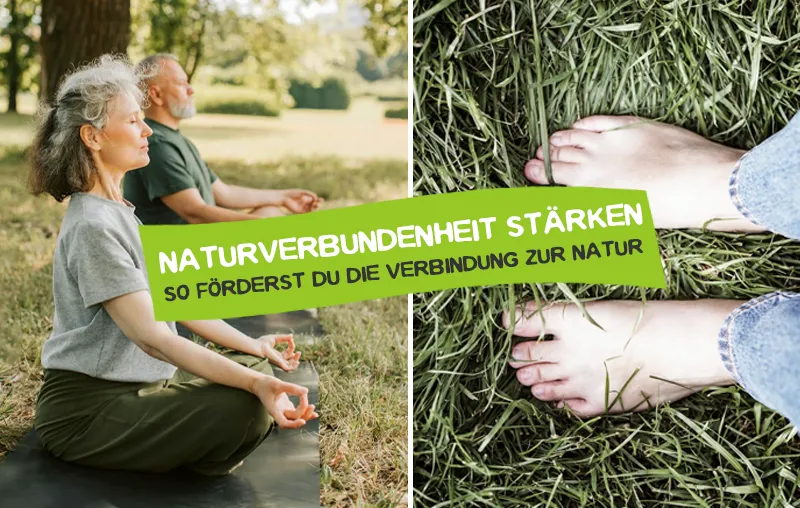
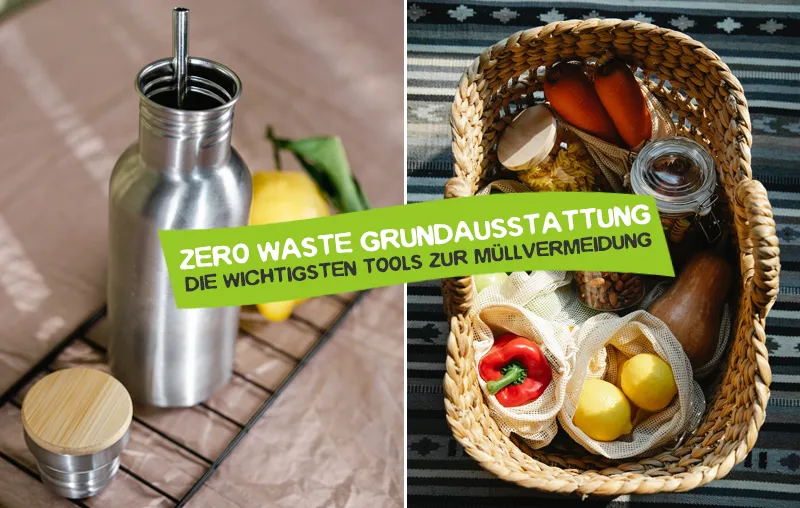

This article answered many of my questions about "Vegan Prejudices - 10 Common Myths and Clichés About Veganism and Plant-Based Diets." I really enjoyed reading the article and got interesting ideas from it. Keep up the good work and write interesting articles on top topics.